Tara Chevrestt's Blog, page 60
April 16, 2014
Makers: Women Who Make America
 What a thought-evoking and interesting documentary about the struggle of women and the many women who have paved the way.
What a thought-evoking and interesting documentary about the struggle of women and the many women who have paved the way.The first episode begins with telling us about a woman who was the first to run a long-distance marathon--notably, the Boston Marathon, in 1967. My mother would have been ten years old and it's incredible to think that had she attempted to run a long-distance marathon, she'd have been physically attacked by the race director in the middle of the race, just because of her sex.
But that's exactly what happened to Katherine Switzer. The only way she could even get in the race was by signing up under her first initial and full last name.
When I think of how that was my mother's "time", I'm appalled at how recent this really occurred.
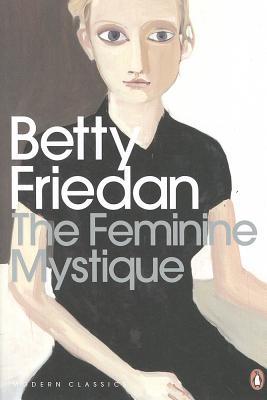 The show then discusses the Feminine Mystique, a book that made many a housewife realize that that deep sense of unhappiness she was feeling was nothing to be ashamed or guilty about. It just meant that she wanted to be more than just so-and-so's wife and so-and-so's mother.
The show then discusses the Feminine Mystique, a book that made many a housewife realize that that deep sense of unhappiness she was feeling was nothing to be ashamed or guilty about. It just meant that she wanted to be more than just so-and-so's wife and so-and-so's mother.The book opened the doors to the women's movement in the sixties and wow! Did it take the world by storm, as the more radical groups claimed that being a housewife was equivalent to being an unpaid slave. It's free labor, after all, for the man. I'd like to think, however, that most of us women nowadays have made our marriages more of partnerships.
One of the most interesting things to me and NOT the least surprising...the first sexual discrimination case presented to the EEOC (Equal Employment Opportunity Commission) was between stewardesses and the airlines.
Having been in aviation for twelve years now, I can totally believe it. The aviation industry still is not always kind to women... But the nasty fact is women hired around 1953 were fired at the age of 32, declared "too old to be in public". After all, she should be at home raising children, right? And this was after discriminatory hiring practices based on their looks, weight, age, and marital status.
Another case presented, a more successful one for the women's rights movement, is Southern Bell telephone company. A woman operator kept applying for higher-paying jobs within the company only to be told over and over again that she could not have the job because she was a woman. In court, SB's defense was that they were protecting her from having to life 30 pounds. It was a lady lawyer to the rescue, a lawyer for the then women's version of the NAACP--NOW that brought 30-pound objects into the courtroom and proved over and over that she could lift them, herself not even 100 pounds.
The case was won. Enter episode two, not my favorite. Why? Now, I'm an open-minded person, and I see what they were trying to do here: show us two sides, but frankly, I didn't care to hear the other side. Did you know there was actually a group of women who OPPOSED the Equal Rights Amendment? The ERA would have ensured equal pay and the overthrowing of many laws that were discriminatory against women, but this ultra-conservative group who was really happy being slave--*coughs*--housewives at the time actually opposed it and much of the second episode followed them and their anti-abortion companions.
If you're happy just cooking and cleaning and changing nappies all day, good for you. If you're happy, I'm happy for you, but don't make it so that women who have chosen to work are stuck making less pay just 'cause we have va-va jays.
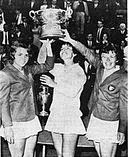 Billie Jean King is on the right.
Billie Jean King is on the right.Picture from Wiki Commons.One good point the anti-ERA movement made though: equal rights would mean that we'd be drafted. Right? Didn't come to pass, but shouldn't we be drafted too?
Moving on. I really liked how this introduced me to a woman named Billie Jean King, who was a tennis player and beat a man in the "battle of the sexes." Did you know that in the sixties, when women first began playing professional tennis, that when the man won the cup he got 2,000 pounds, but when a woman won, she only got 750?
In the seventies, women could not get approved for credit cards without their husband's signature. Didn't matter if SHE was the one making the money. URGH.
The third and final episode (these are all one-hour long, making the "series" three hours total), gets into the eighties and nineties and how the older generation worries we are taking steps backs. After all, the birth control issues was just recently brought up again. But while I understand their concerns, I also have to agree with some of the women who said that the feminist movement is an ongoing, never-ending movement. We may not be out there marching, my generation, but we are feminists in that...we have CHOSEN our paths, not had them dictated to us. If we want to work, we work. If we want to have children and stay home, we do that.
Terrific food for thought though is...are our husbands really pulling their weight around the house or are we working two shifts, one at work, one at home? Make sure your marriage is a true partnership, ladies, and don't revert back to the fifties.
I watched this on Amazon Prime.

Published on April 16, 2014 00:00
April 15, 2014
Bad Karma In The Big Easy Tackles Controversies
I have read a number of mysteries taking place in post-Katrina New Orleans—most notably Tin Roof Blowdown by James Lee Burke and Claire de Witt and the City of the Dead by Sara Gran. Both of these are beautifully written and atmospheric. Bad Karma in the Big Easy by D. J. Donaldson is not in their league, but it’s full of big issues. There are issues involving post-Katrina New Orleans, surrogate mothers, organ cloning, violent media and post- traumatic stress for law enforcement.
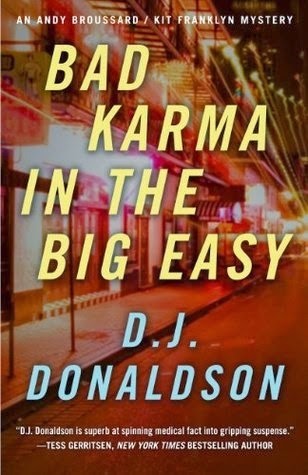 The organ cloning issue is somewhat futuristic as D. J. Donaldson indicates in an author’s note. For some readers, this sort of technology would present a spiritual problem. For others, it would be a tremendous advance that would save lives. I admit that I come down on the side of those who would regard it as beneficial, but I recognize that there is a controversy surrounding it. See http://www.cloneorgans.com and an article by Alex B. Berezow in the UK magazine Wired World for current scientific analysis of the issue.
The organ cloning issue is somewhat futuristic as D. J. Donaldson indicates in an author’s note. For some readers, this sort of technology would present a spiritual problem. For others, it would be a tremendous advance that would save lives. I admit that I come down on the side of those who would regard it as beneficial, but I recognize that there is a controversy surrounding it. See http://www.cloneorgans.com and an article by Alex B. Berezow in the UK magazine Wired World for current scientific analysis of the issue.
This is the seventh book in a series centering on forensic pathologist Andy Broussard and expert in criminal psychology Kit Franklyn. Both are employed by NOPD, and work together. Broussard examines the corpse, and Franklyn determines whether or not this is a case of homicide. I have to say that this is the first mystery I’ve read dealing with New Orleans police that portrays them as competent and capable of solving crimes. Perhaps this is a result of my preference for private investigators. Traditionally, most mysteries that star PIs portray the police as bunglers. There is actually a PI in Bad Karma in the Big Easy who is impressive. So this police procedural doesn’t denigrate PIs despite the fact that PI novels tend to denigrate police.
Kit Franklyn has a problem with post-traumatic stress in this case. I personally liked the way her PTSD was handled, though not all readers would agree. I think that it’s important to point out that not everyone responds to PTSD in the same way, and that people recover at different rates. Some individuals are more resilient than others. I give D. J. Donaldson extra points for recognizing that recovering from PTSD is an individual matter.
I could have done without the sequence involving the alligator. I am not a huge fan of alligators, and would rather not read about them at all. Those who consider gators local color might rate this aspect of the plot as a big plus.
Although I haven’t previously read D. J. Donaldson before, I would be willing to read more in this series. I liked the principal characters and I enjoy reading mysteries set in New Orleans.
I received this galley from the publisher in exchange for an honest review.

 The organ cloning issue is somewhat futuristic as D. J. Donaldson indicates in an author’s note. For some readers, this sort of technology would present a spiritual problem. For others, it would be a tremendous advance that would save lives. I admit that I come down on the side of those who would regard it as beneficial, but I recognize that there is a controversy surrounding it. See http://www.cloneorgans.com and an article by Alex B. Berezow in the UK magazine Wired World for current scientific analysis of the issue.
The organ cloning issue is somewhat futuristic as D. J. Donaldson indicates in an author’s note. For some readers, this sort of technology would present a spiritual problem. For others, it would be a tremendous advance that would save lives. I admit that I come down on the side of those who would regard it as beneficial, but I recognize that there is a controversy surrounding it. See http://www.cloneorgans.com and an article by Alex B. Berezow in the UK magazine Wired World for current scientific analysis of the issue.This is the seventh book in a series centering on forensic pathologist Andy Broussard and expert in criminal psychology Kit Franklyn. Both are employed by NOPD, and work together. Broussard examines the corpse, and Franklyn determines whether or not this is a case of homicide. I have to say that this is the first mystery I’ve read dealing with New Orleans police that portrays them as competent and capable of solving crimes. Perhaps this is a result of my preference for private investigators. Traditionally, most mysteries that star PIs portray the police as bunglers. There is actually a PI in Bad Karma in the Big Easy who is impressive. So this police procedural doesn’t denigrate PIs despite the fact that PI novels tend to denigrate police.
Kit Franklyn has a problem with post-traumatic stress in this case. I personally liked the way her PTSD was handled, though not all readers would agree. I think that it’s important to point out that not everyone responds to PTSD in the same way, and that people recover at different rates. Some individuals are more resilient than others. I give D. J. Donaldson extra points for recognizing that recovering from PTSD is an individual matter.
I could have done without the sequence involving the alligator. I am not a huge fan of alligators, and would rather not read about them at all. Those who consider gators local color might rate this aspect of the plot as a big plus.
Although I haven’t previously read D. J. Donaldson before, I would be willing to read more in this series. I liked the principal characters and I enjoy reading mysteries set in New Orleans.
I received this galley from the publisher in exchange for an honest review.

Published on April 15, 2014 00:00
April 14, 2014
Heroic Measures by Jo-Ann Power
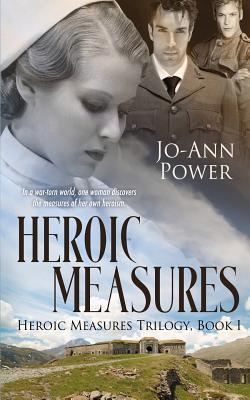 When men looked at her, they saw a woman in uniform. Dedicated. Smart. Or she hoped they did. At the least, they respected her and that satisfied her mightily.
When men looked at her, they saw a woman in uniform. Dedicated. Smart. Or she hoped they did. At the least, they respected her and that satisfied her mightily.I love a good WWI or WWII story, most especially those involving nurses. What brave, incredible women they were, going overseas to face the unknown and help in any way they can, watching so much suffering and pain. This was no disappointment in that aspect. The story of the nurses is here, from training to washing their hair in helmets, to shell-shocked patients, to the sound of bombs, the collapsing of tents, the lack of supplies...
And added into the mix is some romance, conflicting emotions about the people left behind in America, friends, and a doctor killing himself with drink. I kinda liked the story there, kinda. I mean, I couldn't help but feel bad that the doctor is portrayed so badly when really, he's just a man with PTSD. You don't have to be on the battlefield to deal with that. I could understand why he was drinking...but I digress.
Actually, that brings me to my quibble. There were some great opportunities to expand this novel with the secondary characters and I feel the story was weak in that way. It kept introducing us to all these people with what could have been amazing side stories and plots and really barely touched upon them. Lex and the Lafayette Esadrille. The doctor and his decline. The one nurses who for some reason balks at marrying a French comte. What was going on there? Why mention it all if it doesn't really add to the story?
My second quibble is the romance. It appears out of thin air. Why do they love each other? What do they see in each other? She nurses his wounds, maintains a professional demeanor though she finds him handsome, shares a single dance with him in which she tries to ignore he's so handsome...but suddenly she's madly in love with him and he her?
Huh?
That came from nowhere. The romance development is poor. Also, there is no complicated love triangle here. Not that I wanted one, but the story makes it sound like one is coming and the cover is a tad suggestive of one. Just throwing that out there.
But all that aside, I did love this heroine. I love the way she takes over the surgery, the way she makes demands for her patients (chocolate is important!!!), the way she puts the other nurses in their places when they get depressed, how she sticks up to her mean aunt. There was a lot to like about her, especially what she does in the end. Thumbs up to you, lady.
Conclusion: Could have used better development of side stories, secondary characters, and romance, but is a very nice tribute to the nurses who dedicated their time and lives in this war.
Even here we've seen that a woman must have equal status with a man. If she is denied that, everyone loses. And people can die from the failures to ensure it.
I received this via Netgalley.

Published on April 14, 2014 00:00
April 13, 2014
Queenpin by Megan Abbott
 A sexy book if nothing else. Crime noir. Makes me think of Mob City. Speaking of, does anyone know when that's coming back?
A sexy book if nothing else. Crime noir. Makes me think of Mob City. Speaking of, does anyone know when that's coming back?What was sexy about it is the writing. Let me lay out some examples for you.
I'm yours, that's what I told him without every spitting out a word. He could see it on me, feel it on me. He liked to have me on the bare mattress, like the way it rubbed me raw. I liked it. Liked the burn of it. Liked thinking of it all the next day, every time I leaned against anything, every time the strap on my brassiere pulled across it.
But while I could totally feel the heat from the pages, I hated that we got a pretty savvy woman once again suckered by a man. Why do men always have to be our downfall?
Though the narrator does her share of suckering.
I gave him my best walk, half class, half pay-broad. You can twist those two tightly, fellas don't know what hit 'em. They can't peg you. It gets them--the smart ones--going. Spinning hard trying to fix you. You're like the best parts of their grammar school sweetheart and their first whore all in one sizzling package.
Basically: the narrator is seductive, whether you like what she's doing or not.
At only 180 pages, this is a book you just pick up to kill some time. You won't lay it down enlightened, won't muse deeply on anything, won't really remember it a few days later, but it is entertaining as it follows two lady gangsters embroiled in the gambling business--which sometimes has to include murder...
We got the senior Gloria and we got the narrator and just who is going to be betray who? I feel this story could have been expanded on and it would also make a great TV show. I'd love to read something like this without a woman being taken in by a sleezy man though. I'd like to feel the women come out on top for a change.
As for the writing: superb. I'm impressed with this author's voice.
I got this via Paperback Swap.

Published on April 13, 2014 00:00
April 12, 2014
The Reading Radar
Spotted on Edelweiss and on my wishlist: Bittersweet by Colleen McCullough. I do love a good twenties/thirties novel, and you all know I like those nurses and doctors too.
 An unforgettable Australian saga of sisterhood, family, love and betrayal.
An unforgettable Australian saga of sisterhood, family, love and betrayal.
This is the story of two sets of twins, Edda and Grace, Tufts and Kitty, who struggle against all the restraints, prohibitions, laws and prejudices of 1920s Australia. Only the submissive yet steely Grace burns for marriage; the sleekly sophisticated Edda burns to be a doctor, the down-to-earth but courageous Tufts burns never to marry, and the too-beautiful, internally scarred Kitty burns for a love free from male ownership.
Turbulent times, terrible torments, but the four magnificent Latimer sisters, each so different, love as women do: with tenderness as well as passion, and with hearts roomy enough to hold their men, their children, their careers and their sisters.
***
And I had to acquire this one, because I love dogs, women detectives, and a good laugh. Paw Enforcement by Diane Kelly.

Introducing police officer Megan Luz and her loyal K-9 partner Brigit—two Fort Worth cops who are worth their weight in kibble.
SHE’S ON A SHORT LEASH.
Officer Luz is lucky she still has a job after tasering a male colleague where it counts the most. Sure, he had it coming—which is why the police chief is giving Megan a second chance. The catch? Her new partner can’t carry a gun, can’t drive a cruiser, and can’t recite the Miranda Rights. Because her new partner is a big furry police dog. So that’s what the chief meant when he called Megan’s partner a real b*tch…
WILL FATE THROW HER A BONE?
With Brigit out on the beat, Megan is writing up enough tickets to wallpaper the whole station. But when a bomb goes off at the mall’s food court, it’s up to Megan and Brigit to start digging—and sniffing—for clues. With the help of dead-sexy bomb-squad expert Seth Rutledge and his own canine partner named Blast, Megan finds herself in a desperate race to collar a killer. Will justice be served—or will she end up in the doghouse?
***
Spotted on LibraryThing, Amy Bloom's Lucky Us hit the radar/wishlist.
 “My father’s wife died. My mother said we should drive down to his place and see what might be in it for us.”
“My father’s wife died. My mother said we should drive down to his place and see what might be in it for us.”
So begins this remarkable novel by Amy Bloom, whose critically acclaimed Away was called “a literary triumph” by The New York Times. Brilliantly written, deeply moving, fantastically funny, Lucky Us introduces us to Eva and Iris. Disappointed by their families, Iris, the hopeful star, and Eva, the sidekick, journey across 1940s America in search of fame and fortune. Iris’s ambitions take them from small-town Ohio to an unexpected and sensuous Hollywood, across the America of Reinvention in a stolen station wagon, to the jazz clubs and golden mansions of Long Island.
With their friends in high and low places, Iris and Eva stumble and shine through a landscape of big dreams, scandals, betrayals, and war. Filled with gorgeous writing, memorable characters, and surprising events, Lucky Us is a thrilling and resonant novel about success and failure, good luck and bad, the creation of a family, and the pleasures and inevitable perils of family life. From Brooklyn’s beauty parlors to London’s West End, a group of unforgettable people love, lie, cheat, and survive in this story of our fragile, absurd, heroic species.
***
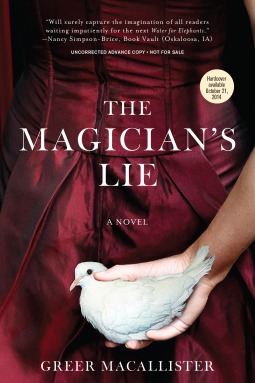 Spotted on NG. It caught my interest because it's about a historical woman magician. Whether she was real or not, that is a cool as heck story line. The Magician's Lie by Greer Macallister. *Cover is not final. It's an ARC cover that was on NG.* Regardless, it's rare for me to read a SB Landmark book and not love it. They have quickly become one of my favorite publishers, even though they only approve my requests half the time. LOL I do believe this title releases in October of this year.
Spotted on NG. It caught my interest because it's about a historical woman magician. Whether she was real or not, that is a cool as heck story line. The Magician's Lie by Greer Macallister. *Cover is not final. It's an ARC cover that was on NG.* Regardless, it's rare for me to read a SB Landmark book and not love it. They have quickly become one of my favorite publishers, even though they only approve my requests half the time. LOL I do believe this title releases in October of this year.
Water for Elephants meets The Night Circus in The Magician’s Lie, a debut novel in which the country’s most notorious female illusionist stands accused of her husband's murder --and she has only one night to convince a small-town policeman of her innocence.
The Amazing Arden is the most famous female illusionist of her day, renowned for her notorious trick of sawing a man in half on stage. One night in Waterloo, Iowa, with young policeman Virgil Holt watching from the audience, she swaps her trademark saw for a fire ax. Is it a new version of the illusion, or an all-too-real murder? When Arden’s husband is found lifeless beneath the stage later that night, the answer seems clear.
But when Virgil happens upon the fleeing magician and takes her into custody, she has a very different story to tell. Even handcuffed and alone, Arden is far from powerless—and what she reveals is as unbelievable as it is spellbinding. Over the course of one eerie night, Virgil must decide whether to turn Arden in or set her free… and it will take all he has to see through the smoke and mirrors
 An unforgettable Australian saga of sisterhood, family, love and betrayal.
An unforgettable Australian saga of sisterhood, family, love and betrayal.This is the story of two sets of twins, Edda and Grace, Tufts and Kitty, who struggle against all the restraints, prohibitions, laws and prejudices of 1920s Australia. Only the submissive yet steely Grace burns for marriage; the sleekly sophisticated Edda burns to be a doctor, the down-to-earth but courageous Tufts burns never to marry, and the too-beautiful, internally scarred Kitty burns for a love free from male ownership.
Turbulent times, terrible torments, but the four magnificent Latimer sisters, each so different, love as women do: with tenderness as well as passion, and with hearts roomy enough to hold their men, their children, their careers and their sisters.
***
And I had to acquire this one, because I love dogs, women detectives, and a good laugh. Paw Enforcement by Diane Kelly.

Introducing police officer Megan Luz and her loyal K-9 partner Brigit—two Fort Worth cops who are worth their weight in kibble.
SHE’S ON A SHORT LEASH.
Officer Luz is lucky she still has a job after tasering a male colleague where it counts the most. Sure, he had it coming—which is why the police chief is giving Megan a second chance. The catch? Her new partner can’t carry a gun, can’t drive a cruiser, and can’t recite the Miranda Rights. Because her new partner is a big furry police dog. So that’s what the chief meant when he called Megan’s partner a real b*tch…
WILL FATE THROW HER A BONE?
With Brigit out on the beat, Megan is writing up enough tickets to wallpaper the whole station. But when a bomb goes off at the mall’s food court, it’s up to Megan and Brigit to start digging—and sniffing—for clues. With the help of dead-sexy bomb-squad expert Seth Rutledge and his own canine partner named Blast, Megan finds herself in a desperate race to collar a killer. Will justice be served—or will she end up in the doghouse?
***
Spotted on LibraryThing, Amy Bloom's Lucky Us hit the radar/wishlist.
 “My father’s wife died. My mother said we should drive down to his place and see what might be in it for us.”
“My father’s wife died. My mother said we should drive down to his place and see what might be in it for us.”So begins this remarkable novel by Amy Bloom, whose critically acclaimed Away was called “a literary triumph” by The New York Times. Brilliantly written, deeply moving, fantastically funny, Lucky Us introduces us to Eva and Iris. Disappointed by their families, Iris, the hopeful star, and Eva, the sidekick, journey across 1940s America in search of fame and fortune. Iris’s ambitions take them from small-town Ohio to an unexpected and sensuous Hollywood, across the America of Reinvention in a stolen station wagon, to the jazz clubs and golden mansions of Long Island.
With their friends in high and low places, Iris and Eva stumble and shine through a landscape of big dreams, scandals, betrayals, and war. Filled with gorgeous writing, memorable characters, and surprising events, Lucky Us is a thrilling and resonant novel about success and failure, good luck and bad, the creation of a family, and the pleasures and inevitable perils of family life. From Brooklyn’s beauty parlors to London’s West End, a group of unforgettable people love, lie, cheat, and survive in this story of our fragile, absurd, heroic species.
***
 Spotted on NG. It caught my interest because it's about a historical woman magician. Whether she was real or not, that is a cool as heck story line. The Magician's Lie by Greer Macallister. *Cover is not final. It's an ARC cover that was on NG.* Regardless, it's rare for me to read a SB Landmark book and not love it. They have quickly become one of my favorite publishers, even though they only approve my requests half the time. LOL I do believe this title releases in October of this year.
Spotted on NG. It caught my interest because it's about a historical woman magician. Whether she was real or not, that is a cool as heck story line. The Magician's Lie by Greer Macallister. *Cover is not final. It's an ARC cover that was on NG.* Regardless, it's rare for me to read a SB Landmark book and not love it. They have quickly become one of my favorite publishers, even though they only approve my requests half the time. LOL I do believe this title releases in October of this year.Water for Elephants meets The Night Circus in The Magician’s Lie, a debut novel in which the country’s most notorious female illusionist stands accused of her husband's murder --and she has only one night to convince a small-town policeman of her innocence.
The Amazing Arden is the most famous female illusionist of her day, renowned for her notorious trick of sawing a man in half on stage. One night in Waterloo, Iowa, with young policeman Virgil Holt watching from the audience, she swaps her trademark saw for a fire ax. Is it a new version of the illusion, or an all-too-real murder? When Arden’s husband is found lifeless beneath the stage later that night, the answer seems clear.
But when Virgil happens upon the fleeing magician and takes her into custody, she has a very different story to tell. Even handcuffed and alone, Arden is far from powerless—and what she reveals is as unbelievable as it is spellbinding. Over the course of one eerie night, Virgil must decide whether to turn Arden in or set her free… and it will take all he has to see through the smoke and mirrors
Published on April 12, 2014 00:00
April 11, 2014
A Captain for Laura Rose by Stephanie Grace Whitson
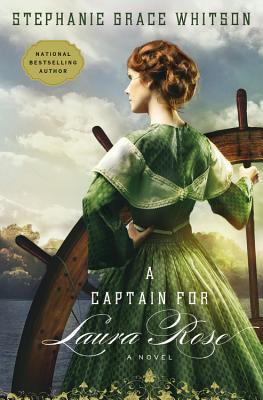 I was drawn to this novel because it's about a woman trying to obtain her riverboat captain's license in a time (just post American Civil War) when women did NOT navigate the river waters on their own. Well, at all. Except for Laura, the heroine, whose father and brother taught her all they knew before they crossed the rainbow bridge, so to speak.
I was drawn to this novel because it's about a woman trying to obtain her riverboat captain's license in a time (just post American Civil War) when women did NOT navigate the river waters on their own. Well, at all. Except for Laura, the heroine, whose father and brother taught her all they knew before they crossed the rainbow bridge, so to speak.First of all, I was fully aware this was a Christian-themed novel and I was fine with that, as I haven't found majority of the Christian novels very preachy lately. Normally, they are just wonderful, spunky heroines facing and overcoming obstacles with a clean romance on the side. This one, however, was a tad preachy, and I found the message hard to discern as I didn't feel the judgmental, overly pious, close-minded characters to be very good examples of what a Christian should be.
Maybe that was the point.
But while I enjoyed Laura's story and parts and reading about all the different problems a steamboat faced as it went up and down the rivers--scarcity of wood, sandbars...I could totally and completely have done without Fiona and Adela. I loathed both characters and while the theme of not assuming the worst and being quick to judge was clear, I didn't feel their bits added enough. Laura's realizing what she was doing was strong; these two horrid women, no.
Had the book eliminated them completely, I'd have been a happy camper. Fiona...wow. You don't get more close-minded and uptight than her and Adela is just a spoiled brat who I can't say redeemed herself in my eyes really. She's a user.
Again, last time I'll say it: I hated Fiona and Adela and all their scenes and this ruined half the story for me.
I also grew tired of the anti-drinking theme. Frankly, I'm a firm believer that if a man or woman works hard all week long, they are entitled to get--excuse me--sh*t faced here and there!!! The book made it seem like anyone who dares to enter a saloon is a bad seed and sinful. I wanted to tell them to get over themselves and, "I'd like to see you not have a drink or two after dealing with this, this, and that."
But I did like Laura and her struggle to get her pilot's license and get up and down the river and honor her family. I really did. We could learn a thing or two from her, us women. To stand up for what we want in the face of adversity and discrimination. WE CAN DO IT.
Favorite LOL moment:
He scowled at her. "Unless, of course, you have another addendum you'd like added? Tea and crumpets served mid-examination, perhaps?
"Oh, no, sir," Laura said, as she rose from her chair. "It's all very satisfactory. I've never cared for tea and crumpets, anyway."
I received this via Netgalley.

Published on April 11, 2014 00:00
April 10, 2014
Strong is Sexy Heroine of the Week: Elsa Schluss
 Book: Blue Damask
Book: Blue DamaskAuthor: Annmarie Banks
Heroine: Elsa Schluss
The best heroines are the strong ones. Scarlet O’Hara uses everything she has to overcome the disruption of her pampered life and bring order and comfort back to her beloved plantation. Jane Eyre is a lively prepubescent girl who pushes back against her bullying cousin, John, and years later pushes back against a bullying employer to win his love. Sexy? Rhett Butler and Edward Rochester think so.
A weak heroine is a boring heroine, so while my characters have flaws to overcome, none of them could be considered weak. We readers want to see some action and adventure, and there is no action from a wilting wallflower, no adventure from a sniveling waif. Bring on the feisty fist-fighters and willful manipulators!
In my latest novel, Blue Damask, I tell the story of an Austrian woman who finds the strength and power to overcome uncontrollable events by using her wits, and sometimes her wiles, but always she outsmarts her adversaries by using their own weaknesses against them.
Elsa Schluss is beautiful, but her beauty is a curse, for she cannot break through the barrier of sexism in her chosen profession. Her colleagues smile and nod at her, then turn away as though she were a silly child.
Yet Elsa spent the war years, 1914-1918, in a field hospital as a surgical nurse, sewing together the mangled bodies of soldiers. She sat at their bedsides with a pencil and paper in hand to write their last words to their mothers and then held their hands and watched them die. She worked thirty-six hour shifts, covered in mud and blood, and yet doctors considered her a menial worker, not a professional woman with valuable skills.
After the war, Elsa enters the University of Vienna to study psychology. She intends to become a therapist in this new field despite the obstacles set before her by the old men who rule the halls of academia. She is determined to continue to help the wounded, for she has learned that many wounded soldiers fell apart when the stitches were removed. Their minds needed to be tended even after their wounds had healed.
An opportunity presents itself in her advisor’s office as an Englishman in a straightjacket is dumped to the floor of the clinic. There is not much time, and the British government is so eager to have this man lucid and functioning that they have sent Field Agent Marshall to get it done any way he can. Elsa must bring the patient back from the brink of insanity while traveling by train and ship and car and horse from Vienna to Damascus.
Marshall hires Elsa to take on this challenge, and what at first seems like an excellent case study for her thesis, turns into a wild adventure in the wastelands of Syria during the violent Arab Revolt of 1921. More is at stake than a student’s paper, a man’s sanity, and a field agent’s career. Elsa finds that working in a field hospital in the Great War is a walk in the park compared to what she must face now in the wastelands of Mesopotamia.
I like how one of my reviewers described her: “the reader is treated to watching Elsa's transformation from a prim, exquisite psychologist to a ready-for-anything heroine covered with dirt and blood and packing a semi-automatic pistol and willing to use it.”
Blurb:
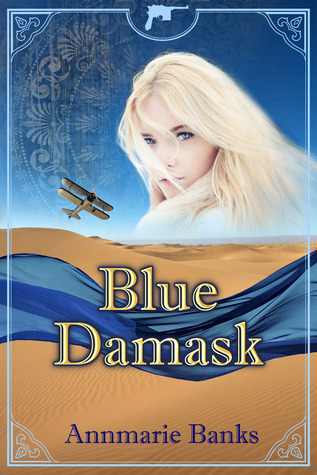 A madman and his therapist traverse the wilds of Syria during the Arab Revolt of 1921.
A madman and his therapist traverse the wilds of Syria during the Arab Revolt of 1921.Three years after the end of a bloody world war, an Englishman in a straightjacket is dumped on the clinic floor of an Austrian psychologist, whose protégé, Elsa Schluss, is reluctantly engaged to treat the traumatized war veteran en route to Damascus where he is to perform one last service for his country. Elsa plans to use him as a case study, but the mysterious mission becomes deadly when they are attacked on the Orient Express. Elsa finds her Jungian training is needed not only to treat her patient, but to outwit the powerful men who threaten their lives and endanger the mind of the man for whom she is responsible. She discovers there is more at stake with this mission than one man’s sanity and a young woman’s doctoral thesis.
Published on April 10, 2014 00:00
April 9, 2014
Female Agents: Honoring the Women Agents of WWII
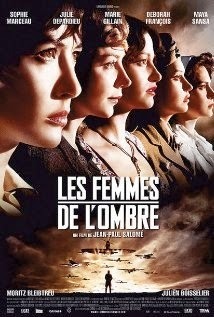 It's 1944 and Churchill's SOE group has their sights set on Normandy. A captured British geologist threatens to ruin everything and quite possibly, turn the tide of the war in the German's favor. They must retrieve him from the clutches of the Gestapo in France...and they trust 5 women and one man to the task.
It's 1944 and Churchill's SOE group has their sights set on Normandy. A captured British geologist threatens to ruin everything and quite possibly, turn the tide of the war in the German's favor. They must retrieve him from the clutches of the Gestapo in France...and they trust 5 women and one man to the task.There's a former prostitute in prison for a killing a man. She's recruited in exchange for her life. She surprised me and quickly became a favorite. Louise...is the leader, the one who feels responsible. She's hardened, and I suppose she must be after watching her husband shot before her very eyes. There's some former dancer who romanced a Nazi officer. I didn't quite "get" her. Woman four is a young blonde, and the fifth is a Jewish Italian nurse who takes no nonsense.
The movie is action packed and suspenseful. Shooting, torture, secrets, jumping from airplanes, escaping the Gestapo. You never know who is going to be shot next or what plans will go awry. Naturally, nothing goes according to plan, and the women are constantly fleeing for their lives or regrouping...or worse. Not everyone can withstand torture...
There's nudity. Some made perfect sense, such as the dancers distracting the hospital soldiers, but some of it didn't--the weird death scene in which the girl took all her clothes off... I couldn't figure that out.
As I said above, the former prisoner/woman of ill repute became a favorite of mine, though Louise and the Italian woman were very strong too. I could have done without Suzy and the blonde.
I must say though, the characterizations were somewhat poorly done. My favorite woman made it clear she just wanted to take the money and run after the first task, what she'd agreed to, but then suddenly she became the most gung-go, the most determined to complete the next assignment. It was never explained, this change in her demeanor. And Suzy confused me.
I have a huge quibble: The movie is French and thus has English subtitles, but when they speak English, there is nothing, no captioning for the hearing impaired, nada. Thankfully these scenes are minor and I could get the gist of what was going on, but it made me disgruntled nevertheless.
The best part though is that apparently this movie was inspired by a real woman (Louise's character) named Lisé de Baissac and I feel that it made a great tribute to the women who helped Normandy come to pass and thus, won the war.
I rented this on Amazon.

Published on April 09, 2014 00:00
April 8, 2014
Bitter Winds (Tales of the Scavenger's Daughters, Book Three) by Kay Bratt
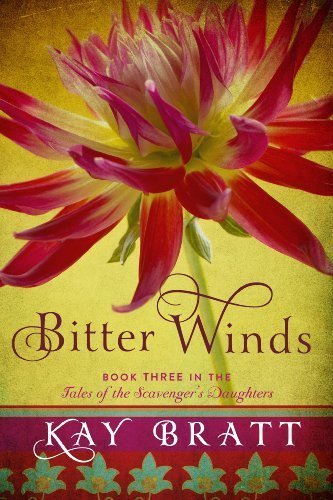 Kay Bratt always has a moral in her stories. I'm noticing a recurring lesson...about bitterness. The story of Li Jin and Sami here is a prime example of what bitterness can do to us if we don't let it go. Li Jin lets go and finds happiness being surrounded by her family. Though surrounded by the same family, Sami is filled with bitterness and hate.
Kay Bratt always has a moral in her stories. I'm noticing a recurring lesson...about bitterness. The story of Li Jin and Sami here is a prime example of what bitterness can do to us if we don't let it go. Li Jin lets go and finds happiness being surrounded by her family. Though surrounded by the same family, Sami is filled with bitterness and hate.Why? Because she won't let herself be loved and will not let herself love others. You can't be hurt that way, right?
But through her story, we see that's def not the way to live.
I should probably mention what this book is about, eh? It's present-day China and one of the scavenger's daughters, Lily, gets arrested for begging and suspicion of following Falun Gong--a peaceful religion that China's gov't has banned. While her family tries to get her out, the story with Sami and Li Jin plays out.
I hated Sami. But as with the other Kay Bratt books, while I hated her, I also saw why she is the way she is. I understood her. Her hatred is a way to fight love--which in her experience only causes pain. If you don't care for anyone, nobody can hurt you. Her sleeping with men is in her eyes, a way of taking control. She's picking and choosing her lovers, at least. It is also the only way she FEELS, so hardened she is. Her story made me sad and left me with a bitter taste. I feel it's also unresolved, but...while I wish she'd received her HEA or at least changed into a better person, at the same time--I also hope we've seen the last of her.
But my favorite story is Lily and Ivy, the twins. Lily is blind and I totally "got her". She wants so badly to be independent. As a person with a handicap myself, I understood the dilemmas she was facing every day. Sometimes we need help, but then we feel like our helper isn't letting us do anything for ourselves. It's a fine line. Helpers often end up smothering us, and at the same time we, the disabled, come across as ungrateful, only wanting other people when we need them and then pushing them away when we feel smothered or frustrated by our lack of independence. Terrific story there. I hope people catch that.
And once again, Ms. Bratt has managed to educate me, about the Chinese mental health system and the gov't corruption, about the persecution of Falun Gong followers and their "re-education". *snort*
It's sad. Very sad. Thank you, Ms. Bratt, for making us aware of it.
Well written, suspenseful, emotional. You love some of the people, hate some others, want to slap a few of them, shake your head at times, and always, always get wrapped up in their lives and troubles and walk away enlightened.
Favorite part: (Lily and Ivy are on a bus when a rude passenger makes a comment about Lily's blindness. This is Lily's reply.)
"Forget about her. What about you? They might be able to fix her eyes someday, but you're out of luck because they can't fix stupid."
LOL
I received this from the author in exchange for an honest review.

Published on April 08, 2014 00:00
April 7, 2014
Isabella: Braveheart of France by Colin Falconer
 This story is infuriating. Imagine being married to a man who not only takes a lover under your nose, but also flaunts it in front of the entire court? Imagine being a queen only to watch another advise your husband and king, gather all the riches, lands, and titles for himself while spreading lies about you. Imagine watching your husband think with the wrong head not once, but twice, each time causing civil war in the nation. And yet you stand there and constantly try to placate the nobles, write letters asking for aide for your wayward, thoughtless husband, deny your own happiness...
This story is infuriating. Imagine being married to a man who not only takes a lover under your nose, but also flaunts it in front of the entire court? Imagine being a queen only to watch another advise your husband and king, gather all the riches, lands, and titles for himself while spreading lies about you. Imagine watching your husband think with the wrong head not once, but twice, each time causing civil war in the nation. And yet you stand there and constantly try to placate the nobles, write letters asking for aide for your wayward, thoughtless husband, deny your own happiness...This is my second novel about Isabella, the French princess turned English queen of the homosexual Edward. In the first one, I read, The She-Wolf by Pamela Bennetts, she was portrayed as a bitch, a woman who used her own son to attain her own goals.
I became quite engrossed in this version of Isabella and her tumultuous marriage. I could relate to her a lot better than I could Bennetts' version. I could feel empathy and frustration for her; wanted to pull my hair out at times. I like that for once, this queen is portrayed in a manner that doesn't scream "manipulative, evil beeyotch". Instead, the author has showed us how she was treated, how she tried to be a good wife and queen, how out-of-her-control it all was. When she finally takes revenge, it's a long time coming. I mean, seriously, just how much can one woman take? Frankly, I thought it took her too long.
This novel made me see not a she-wolf, but a woman trying to take back what should have been rightfully hers all along. As the front cover says, she was taught to obey, but it's time to rebel. After all she'd been through, I was thrilled when she finally stands for herself.
Something I prefer about this story over She-Wolf is that it takes us through the Gaveston drama, not just Despenser.
I do have some quibbles and most are editorial. I became confused at times about who was good and who was bad. Take "Burstbelly" for example. Was he with them or against them? It seemed to change every time he was mentioned and I don't think the man was switching sides.
"Burstbelly died two nights ago, in Halborn....He was the last one who stood for me against the barons."
And just a few pages before it had said, "Edward summons a Parliament but Lancaster and Burstbelly--she smiles at Gaveston's description--and the other magnates refuse to attend because Gaveston is there.
So...I became a tad confused. But maybe it's just me.
I also grew tired of Isabella reminding us at the end of what seemed every other chapter that she was going to make Edward love and adore her one day, that one day she will have his heart, yada yada. That and the "I'm the daughter of the king of France" became repetitive.
The late-blooming romance with Mortimoor is weird. It's like a love/hate thing and I didn't get it.
There are some editing errors, some minor typos, some doors that open despite the fact they are locked, etc, and I noticed the errors increased in the last half of the story. At that point, even the dead come alive again--Pembroke appears speaking twice after his death and her father is mentioned as well as though he still alive. The present-tense narrative is a bit jarring at first and at times it suddenly becomes first person and my version didn't have italics, making me do a double-take sometimes. Also, I hate this new trend of not putting commas before a person's name when the speaker is addressing him. I get it's a new way, but I hate it. Loathe it. In my day, when you spoke to someone, it was, "It's not what you think, Isabella," not "It's not what you think Isabella."
I don't care if everyone is doing it now; I still hate it.
But I read this quickly. It was interesting, not too heavy on historical details. One of my quibbles with She-Wolf was that at times it began to read like a biography. Falconer doesn't go overboard with that stuff. He also doesn't waste pages and pages describing a room or a dress.
"I shall not submit like a pretty little lamb and let them make the rest of my life sewing and walking in the garden. I am a queen. I want my place at the council and at the king's side and if he will not give it to me I will force his hand. He will see that I am no coward. If he will call for rain then I will give him a tempest."
I received this in digital format from the author in exchange for an honest review.

Published on April 07, 2014 01:00



